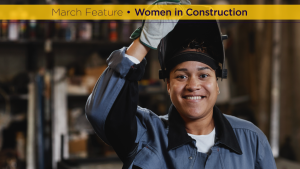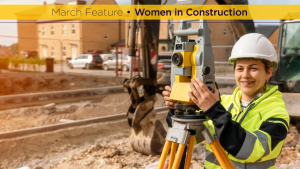Laird Cronk, president of the BC Federation of Labour, recalls attending a conference with other high-level leaders. While having some friendly drinks another leader began telling the group a demeaning joke about women.
“I know everyone can appreciate this moment,” said Cronk, who retold the incident during a session for the BC Centre for Women in the Trades’ Women Build BC conference.
At the time of the incident he had recently taken Be More Than a Bystander training developed by the Ending Violence Association of BC (EVA) and was now confronted with a real-life scenario.
In fact, Cronk was even wearing an “I Am More Than a Bystander” shirt.
“Taking on colleagues and that peer pressure can give you pause at times,” said Cronk. “This was a significant colleague and a major power player telling this joke.”
Cronk turned his back to the group, motioning to his shirt, which calmly diffused the situation and diverted the conversation. When another demeaning joke began, Cronk again turned his back and pointed to his shirt, saying “I can do this all night.”

“I didn’t change the world,” said Cronk. “I just made a simple statement. I had the ability to find a way to stop this and break the chain. For me that was a powerful experience. You can’t not do something once you know what to do.”
That was the subject of a session that Cronk and other prominent male leaders participated in for the Women Build BC Conference. Cronk, former BC Lions athlete and Be More Than a Bystander spokesperson J.R. LaRose, BC Construction Association president Chris Atchison and Industry Training Authority director Rod Bianchini discussed their own journeys of personal growth to become better allies for women and why men have a responsibility stop harmful behaviour.
“One of the key takeaways from my training is it is predominantly men causing the harm,” said Cronk. “This is a small amount of men but the rest us need to step up and stop it. It is our responsibility to fix this and that was a powerful lesson for me to learn.”
Bianchini found himself in a similar situation at a high-level industry meeting where someone was making snide remarks and jokes about women being in the trades.
“I had that deer in the headlights moment,” said Bianchini. “What was going through my head was how I was going to deal with this. I can’t let it go. I was armed with tools from the program and, to be frank, had it been just two weeks before I probably would have let it go and be satisfied thinking ‘that is just what some tradeworkers do or say.’ But now it isn’t just unacceptable to me, I cannot un-see it.”
He took the person aside and explained those comments were not helpful and could even be harmful to the industry.
“I didn’t get much of a reaction, but at that point I didn’t much care if I got one. This is a muscle that needs to be exercised,” he said.
Atchison explained the treatment of women in the construction industry not only needs to change because it is the right thing to do, its future depends on it.
“The importance of a program like Be More Than a Bystander is immeasurable,” said Atchison. “Ever since there has been construction there has been systemic barriers to prevent women from being successful on sites.”
Atchison said one of his biggest takeaways from the training was accepting that men, especially those in leadership roles, wield tremendous power. With that power comes a responsibility to help change society and workplace culture.
“We have a system that is broken, and we need to fix the system, not the women who are coming into it,” said Atchison. “We need to fix our culture to make it accepting of everyone. For years we have done a disservice to underrepresented groups by saying this is a great job, it’s dirty but it pays well, it has good benefits, come on in.”
Atchison explained this has led to increased recruitment but lacklustre retention.
“We made promises, but the industry is not mature or evolved enough to retain these people,” said Atchison. “Programs like this are equipping co-workers and employers to bet better so we can retain the workers we need to build this province.”
Tracy Porteous, EVA’s executive director, who developed the original program and later helped tailor it for the construction industry, explained the power that men being allies brings.
“What a breath of fresh air it is to stand beside our brothers and see you teach other men that there are 1,000 ways they can speak up and be more than a bystander.”
BCCWITT and EVA so far have gotten 100 people through the Be More Than a Bystander training program.
Follow the author on Twitter @RussellReports.











Recent Comments
comments for this post are closed